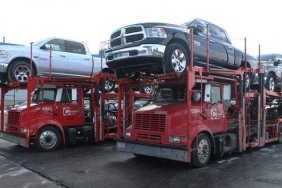 Biking is a fun way to enjoy the outdoors, but if you don’t have a bedded truck or a spacious SUV, then you’ll need a way to transport yours. Earlier this week, we took a look at some tips regarding bike racks for your trunk, and today we’ll explore hitch-mounted racks.
Biking is a fun way to enjoy the outdoors, but if you don’t have a bedded truck or a spacious SUV, then you’ll need a way to transport yours. Earlier this week, we took a look at some tips regarding bike racks for your trunk, and today we’ll explore hitch-mounted racks.
Most vehicles equipped with a hitch receiver are compatible with a hitch rack, but you can also install a hitch receiver on your vehicle if it doesn’t have one. Hitches are divided into classes according to towing capacity, ranging from Class I, which fits pretty much any vehicle and tows up to 2,000 lbs, through Class V, which fits only full-sized pickup trucks, vans, and SUV’s and tows up to around 10,000 lbs. Hitch racks are usually compatible with Class II hitches and higher, simply because a Class I hitch’s tongue can’t support heavy loads. Be sure to check your owner’s manual the classification of your vehicle’s hitch before purchasing and mounting a hitch rack.
Typically, hitch racks come in models to accommodate two to five bikes, and with attachments, can carry other gear, too, such as snowboards or skis. Hitch racks will vary in price, depending on what features they offer and what materials they’re made from. For instance, a hitch rack that swings, tilts, or folds up to allow access to the rear door of your vehicle may cost more than one that doesn’t.
Fans of hitch racks like them because they’re less expensive than some other rack types, mount easily to your vehicle’s receiver, and your bike can be mounted to them with minimal lifting. Furthermore, with a hitch rack, your bikes will be positioned further from your vehicle than with trunk hitches, making your vehicle’s paint less likely to be scratched. Also, some models are able to fold flat against your vehicle to allow parking or storage clearance, and you can buy locks for your hitch rack, too.
There are some things that people take issue with, regarding hitch racks. For instance, unless you buy a specific model, some hitch racks block access to your vehicle’s trunk or rear door. The other side of that coin is that models that do swing away also tend to be the most expensive. While mounted, there’s a chance that your bikes will partially obstruct your taillights, rear license plate, or your view out of the rear-view window.
Like trunk racks, hitch-mounted bike racks are a popular, less expensive option for bikers. The information outlined above will help make your decision-making process a little more informed if you find yourself shopping for a bike rack.








